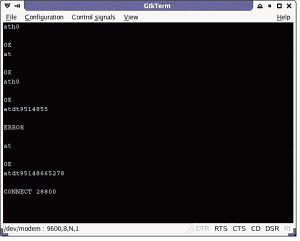Welcome to the LinuxFocus July/August 2004 issue
 The LinuxTag was held end of June in
Karlsruhe, Germany. It is the biggest Linux event in Germany
and as stated on the banner above the
entrance also the biggest in Europe. However if we compare
it to LSM in France or Fosdem in Belgium it is less
international than the later two. LinuxTag had presentations in
English but most things (including the web site
http://www.linuxtag.org) is in German. It is also not so much a
come together for Linux fans and developers but a Linux fair.
Hp, Novell, Redhat, IBM and many others had all big booths. Non
commercial projects like Gentoo, KDE, cinepaint, symlink, ffii
... were also there. Over 100 booth in total. It was good to
see how big and important Linux is and LinuxTag is a
presentation/exhibition of the Linux success to the public but
I really missed the enthusiastic workshop atmosphere that you
find at other Linux events. It would be nice if LinuxTag would
be more international and had not only booth and presentations
but also workshops for the community.
The LinuxTag was held end of June in
Karlsruhe, Germany. It is the biggest Linux event in Germany
and as stated on the banner above the
entrance also the biggest in Europe. However if we compare
it to LSM in France or Fosdem in Belgium it is less
international than the later two. LinuxTag had presentations in
English but most things (including the web site
http://www.linuxtag.org) is in German. It is also not so much a
come together for Linux fans and developers but a Linux fair.
Hp, Novell, Redhat, IBM and many others had all big booths. Non
commercial projects like Gentoo, KDE, cinepaint, symlink, ffii
... were also there. Over 100 booth in total. It was good to
see how big and important Linux is and LinuxTag is a
presentation/exhibition of the Linux success to the public but
I really missed the enthusiastic workshop atmosphere that you
find at other Linux events. It would be nice if LinuxTag would
be more international and had not only booth and presentations
but also workshops for the community.
Click here to get
to the LinuxTag 2004 picture gallery
-- Guido Socher
LinuxFocus.org Articles
UNIX Basics
Software Development
Applications
Kernel Corner
![[translated]](../../common/images/frame_tux.gif) Data Loss: Worst Case Scenario , by
Detlef Müller
Data Loss: Worst Case Scenario , by
Detlef Müller
A real-life case of data loss with a happy end, thanks to
reiserfsck. Three cheers for journaling file systems and
their tools.
![[translated]](../../common/images/frame_tux.gif) Interview with Jeff Dike , by Floris
Lambrechts
Interview with Jeff Dike , by Floris
Lambrechts
User Mode Linux, UML in short, is one of the many interesting
features in the 2.6.x Kernel. This is an interview with Jeff
Dike, the creator of UML.
System Administration
![[translated]](../../common/images/frame_tux.gif) vsftpd - An Introduction to the Very
Secure FTP Daemon , by Mario M. Knopf
vsftpd - An Introduction to the Very
Secure FTP Daemon , by Mario M. Knopf
This article gives a basic introduction to the "Very Secure
FTP Daemon". I am beginning with a general description of FTP
and vsftpd. After that we will have a look at the
installation, configuration and start options of the vsftp
daemon.
The LinuxFocus Tip
 A HyperTerminal for Linux
A HyperTerminal for Linux
Some times you just what to connect to a router via serial line
or you need to test a modem. All you need is a dumb terminal
that attaches to the serial line with a given speed, no parity,
8-bit etc... Most Linux distributions offer minicom or kermit
for this task. Those program are however terrible to use for
such a simple taks. They are way to complex to configure.
Here are two very good alternatives:
gtkterm:
gtkterm is serial port terminal written in GTK+. Just run
gtkterm -p /dev/ttyS0
and you can comunicate over the rs232 line. To dial out with a
modem you just type ATDTyourPhoneNumber and hit return. A nice
feature of gtkterm is that it shows you the status of the RS232
control lines (DTR, RST, CTS, CD, DSR, RI).
gtkterm is available from http://www.jls-info.com/julien/linux/
(local copy: gtkterm-0.99.4.tar.gz,
276Kb)
cu:
cu is a serial port terminal that you just start in a shell (no
GUI). You use cu like this:
cu -l /dev/ttyS0 dir
To get out of cu type: ~.
cu is part of the uucp package: http://www.airs.com/ian/uucp.html
 The LinuxTag was held end of June in
Karlsruhe, Germany. It is the biggest Linux event in Germany
and as stated on the banner above the
entrance also the biggest in Europe. However if we compare
it to LSM in France or Fosdem in Belgium it is less
international than the later two. LinuxTag had presentations in
English but most things (including the web site
http://www.linuxtag.org) is in German. It is also not so much a
come together for Linux fans and developers but a Linux fair.
Hp, Novell, Redhat, IBM and many others had all big booths. Non
commercial projects like Gentoo, KDE, cinepaint, symlink, ffii
... were also there. Over 100 booth in total. It was good to
see how big and important Linux is and LinuxTag is a
presentation/exhibition of the Linux success to the public but
I really missed the enthusiastic workshop atmosphere that you
find at other Linux events. It would be nice if LinuxTag would
be more international and had not only booth and presentations
but also workshops for the community.
The LinuxTag was held end of June in
Karlsruhe, Germany. It is the biggest Linux event in Germany
and as stated on the banner above the
entrance also the biggest in Europe. However if we compare
it to LSM in France or Fosdem in Belgium it is less
international than the later two. LinuxTag had presentations in
English but most things (including the web site
http://www.linuxtag.org) is in German. It is also not so much a
come together for Linux fans and developers but a Linux fair.
Hp, Novell, Redhat, IBM and many others had all big booths. Non
commercial projects like Gentoo, KDE, cinepaint, symlink, ffii
... were also there. Over 100 booth in total. It was good to
see how big and important Linux is and LinuxTag is a
presentation/exhibition of the Linux success to the public but
I really missed the enthusiastic workshop atmosphere that you
find at other Linux events. It would be nice if LinuxTag would
be more international and had not only booth and presentations
but also workshops for the community.![[translated]](../../common/images/frame_tux.gif) Why does this not work!? How to find and
fix faults in Linux applications. , by Guido Socher
Why does this not work!? How to find and
fix faults in Linux applications. , by Guido Socher![[translated]](../../common/images/frame_tux.gif) Temperature Monitoring With Linux (Part
2) , by Stefan Blechschmidt
Temperature Monitoring With Linux (Part
2) , by Stefan Blechschmidt![[translated]](../../common/images/frame_tux.gif) Dia, a diagram creation program , by
Katja Socher
Dia, a diagram creation program , by
Katja Socher![[translated]](../../common/images/frame_tux.gif) Data Loss: Worst Case Scenario , by
Detlef Müller
Data Loss: Worst Case Scenario , by
Detlef Müller![[translated]](../../common/images/frame_tux.gif) Interview with Jeff Dike , by Floris
Lambrechts
Interview with Jeff Dike , by Floris
Lambrechts![[translated]](../../common/images/frame_tux.gif) vsftpd - An Introduction to the Very
Secure FTP Daemon , by Mario M. Knopf
vsftpd - An Introduction to the Very
Secure FTP Daemon , by Mario M. Knopf A HyperTerminal for Linux
A HyperTerminal for Linux